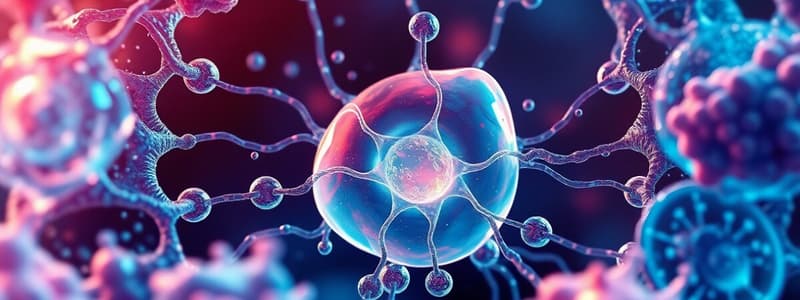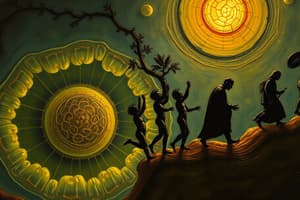Podcast
Questions and Answers
What are the three main components of cell theory?
What are the three main components of cell theory?
All living organisms are composed of cells, the cell is the basic unit of life, and all cells arise from pre-existing cells.
List the three domains of life.
List the three domains of life.
Bacteria, Archaea, and Eukarya.
What roles do proteins play in biological organisms?
What roles do proteins play in biological organisms?
Proteins function in structure, enzymes, transport, and signaling.
Define natural selection.
Define natural selection.
What is the primary purpose of photosynthesis?
What is the primary purpose of photosynthesis?
What is homeostasis?
What is homeostasis?
Describe Mendelian genetics in brief.
Describe Mendelian genetics in brief.
What is the function of the immune system?
What is the function of the immune system?
Flashcards are hidden until you start studying
Study Notes
Key Concepts in Biology
1. Cell Theory
- All living organisms are composed of cells.
- The cell is the basic unit of life.
- All cells arise from pre-existing cells.
2. Classification of Living Organisms
- Domains: Bacteria, Archaea, Eukarya.
- Kingdoms: Animalia, Plantae, Fungi, Protista (Eukarya).
- Organisms are classified based on shared characteristics and evolutionary history.
3. Biological Macromolecules
- Proteins: Composed of amino acids; function in structure, enzymes, transport, and signaling.
- Nucleic Acids: DNA and RNA; store and transmit genetic information.
- Carbohydrates: Sugars and starches; provide energy and structural support.
- Lipids: Fats, oils, and steroids; involved in energy storage and cell membranes.
4. Genetics
- DNA Replication: Process of copying DNA prior to cell division.
- Gene Expression: Transcription (DNA to RNA) and translation (RNA to protein).
- Mendelian Genetics: Principles of inheritance; dominant and recessive traits.
5. Evolution
- Natural Selection: Mechanism of evolution; survival of the fittest.
- Speciation: Formation of new species through evolutionary processes.
- Common Descent: All species share a common ancestor.
6. Ecology
- Ecosystems: Interaction of living organisms with their environment.
- Food Chains/Webs: Energy flow through trophic levels; producers, consumers, decomposers.
- Biomes: Large ecological areas with distinct climates and organisms (e.g., forests, deserts).
7. Physiology
- Homeostasis: Maintenance of stable internal conditions (temperature, pH, etc.).
- Organ Systems: Groups of organs working together (e.g., circulatory, respiratory).
- Metabolism: Chemical processes for energy production; includes catabolism and anabolism.
8. Human Biology
- Cells: Basic unit of life; includes prokaryotic and eukaryotic cells.
- Immune System: Defends against pathogens; involves white blood cells, antibodies.
- Reproductive System: Mechanisms for reproduction; includes sexual and asexual reproduction.
9. Biochemical Processes
- Photosynthesis: Conversion of light energy into chemical energy in plants.
- Cellular Respiration: Process of converting glucose into ATP for energy.
- Enzyme Function: Biological catalysts that speed up chemical reactions.
Important Practices in Biology
- Observation and Experimentation: Key methods for gaining scientific knowledge.
- The Scientific Method: Steps include observation, hypothesis, experimentation, and conclusion.
- Ethics in Biology: Consideration of moral implications in biological research and applications.
Key Concepts in Biology
Cell Theory
- All living entities are made up of cells, which serve as the fundamental unit of life.
- Cells originate from pre-existing cells through division.
Classification of Living Organisms
- Organisms are categorized into three domains: Bacteria, Archaea, and Eukarya.
- Eukarya includes four kingdoms: Animalia, Plantae, Fungi, and Protista, based on shared traits and evolutionary lineage.
Biological Macromolecules
- Proteins: Made of amino acids; essential for structure, enzyme activity, transport, and signaling.
- Nucleic Acids: DNA and RNA molecules store and convey genetic information.
- Carbohydrates: Include sugars and starches, providing energy and supporting structural integrity.
- Lipids: Comprise fats, oils, and steroids, playing roles in energy storage and forming cell membranes.
Genetics
- DNA Replication: Critical for genetic continuity; DNA is duplicated before cell division.
- Gene Expression: Involves transcription, where DNA is converted to RNA, followed by translation, creating proteins from RNA.
- Mendelian Genetics: Describes the inheritance of traits through dominant and recessive alleles.
Evolution
- Natural Selection: The primary driver of evolution, where organisms better adapted to their environment survive and reproduce.
- Speciation: The evolutionary process resulting in the emergence of new species.
- Common Descent: The theory that all current species descend from a shared ancestor.
Ecology
- Ecosystems: Complex networks of interactions among living organisms and their environments.
- Food Chains/Webs: Illustrate the flow of energy through different trophic levels, including producers, consumers, and decomposers.
- Biomes: Major ecological zones distinguished by their climate and resident organisms, such as forests and deserts.
Physiology
- Homeostasis: The regulatory mechanisms that keep internal conditions stable, such as temperature and pH.
- Organ Systems: Collaborating organs form systems like the circulatory and respiratory systems, essential for various bodily functions.
- Metabolism: Encompasses all chemical reactions involved in energy production, including catabolic (breakdown) and anabolic (building up) pathways.
Human Biology
- Cells: The basic units of life; categorized into prokaryotic and eukaryotic cells.
- Immune System: Protects against diseases, involving components like white blood cells and antibodies.
- Reproductive System: Facilitates reproduction through mechanisms of sexual and asexual reproduction.
Biochemical Processes
- Photosynthesis: The process by which plants convert light energy into chemical energy, yielding glucose and oxygen.
- Cellular Respiration: Converts glucose into ATP, the energy currency of cells.
- Enzyme Function: Enzymes act as catalysts, accelerating biochemical reactions in organisms.
Important Practices in Biology
- Observation and Experimentation: Fundamental techniques for acquiring scientific knowledge.
- The Scientific Method: A systematic approach involving observation, hypothesis formulation, experimentation, and drawing conclusions.
- Ethics in Biology: Addresses the moral considerations and implications associated with biological research and its applications.
Studying That Suits You
Use AI to generate personalized quizzes and flashcards to suit your learning preferences.




